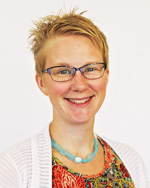Angela LaMora, Ph.D.
 Associate Professor of Biology
Associate Professor of Biology
Chair of the Division of Science and Mathematics
Office: Voigt Science Hall 120A
Phone: (618) 537-6895
Education
Ph.D., Pharmacological & Physiological Science, Saint Louis University (2009).
B.S., Chemistry with emphasis in Biochemistry and minors in Psychology, Philosophy, and Religion. Lindenwood University (2003).
Teaching Interests
Cellular and Molecular Biology, Anatomy and Physiology, Genetics, Developmental Biology
Publications
Cox JA, LaMora A, Johnson SL, Voigt MM (2013). Novel role for carbamoyl phosphate
synthetase 2 in cranial sensory circuit formation. Int J Dev Neurosci. 2014 Apr;33:41-8.
Lu B, LaMora A, Sun Y, Welsh MJ, Ben-Shahar Y (2012). ppk23-Dependent chemosensory functions contribute to courtship behavior in Drosophila melanogaster. PLoS Genet. 2012;8(3).
Cox JA, LaMora A, Johnson SL, Voigt MM (2011). Diverse mechanisms for assembly of branchiomeric nerves. Dev Biol. 357(2):305-17.
LaMora, A and Voigt, MM (2009). Cranial sensory ganglia neurons require intrinsic N-cadherin function for guidance of afferent fibers to their final targets. Neuroscience 159: 1175–1184.
Kucenas, S, Cox, JA, Soto, F, LaMora, A. Voigt, MM (2009). Ectodermal P2X receptor function plays a pivotal role in craniofacial development of the zebrafish. Purinergic Signaling, 5(3): 395.
Teaching Philosophy
Knowledge is attained by curious individuals. A person must ask a question and search
for a solution in order to retain information in a meaningful way. Therefore, it is
my primary goal to get students asking questions and riddling out solutions.
Research Interests
My research focuses on understanding the neural mechanisms governing animal behavior
and physiology. I want to understand how events in the external world (which are received
by the nervous system) get translated into motor output – that is, animal behavior
or physiology.
Organizations & Memberships
Society for Neuroscience
Genetics Society of America
Future Educators, Washington University
Young Scientists Program, Washington University
